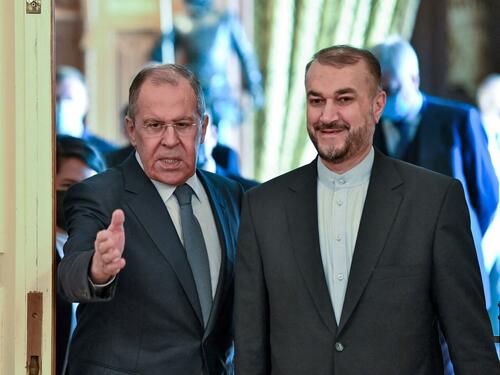Nuke Deal Breakthrough? Iran & US Considering Direct Talks As Momentum Builds
The US State Department issued a Monday statement reaffirming it is finally willing to hold “direct talks” with Iran as nuclear negotiations with world powers proceed positively in Vienna. While for months last year talks remained stalled after the more hardline government of Ebrahim Raisi came to power in Tehran, things appear to have progressed rapidly in recent weeks, leading now to this potential breakthrough.
“We are prepared to meet directly,” a State Department spokesperson said Monday. Throughout Vienna talks, US officials have only dealt with Iran indirectly via European intermediaries. “We have long held the position that it would be more productive to engage with Iran directly, on both JCPOA negotiations and other issues,” the spokesperson said.
The State Dept. official said further that direct engagement would allow “more efficient communication” enabling the two sides to possibly reach a restored JCPOA nuclear deal, which the Trump administration had unilaterally pulled the US out of in 2018. The Islamic Republic has consistently demanded that Washington drop all sanctions, which has decimated its economy and left it severely isolated on a global stage.
The US has still expressed its unwillingness to remain at the table for long: “Given the pace of Iran’s nuclear advances, we are almost out of time to reach an understanding on mutual return to full implementation of the JCPOA,” the official was quoted further as saying.
While acknowledging that it’s yet to reach the point of direct talks with the US, Foreign Minister Hossein Amirabdollahian has responded by saying the Iranians are indeed open to such engagement:
“Reports saying that Iran and the US are directly negotiating with one another are untrue,” Amirabdollahian said during a news conference in the Iranian capital, Tehran.
“However, if we get to a stage where reaching a good deal with strong guarantees necessitates direct talks with the US, we will consider it.”
Starting last month, the Biden admin’s special envoy for Iran Robert Malley said for the first time that American diplomats remained willing to meet their Iranian counterparts “at any time and any place” – which appears to have got the ball rolling toward that end.
Up to this point, Iran had rejected the possibility of dealing with the US side directly, saying that Washington alone had collapsed the JCPOA nuclear deal. So far it’s only dealt with the remaining signatories in Vienna. Tehran had also demanded as a precondition the US return to compliance by removing all Trump-era and additional sanctions. It appears the US side has hinted it is ready to deal seriously on this point, but concerns remain over Iran long ago breaching uranium enrichment caps stipulated under the original deal as talks had stalled.
But there’s still reason for serious caution, and a bumpy negotiating road still ahead, as the latest Wall Street Journal reporting suggests, severe disagreement remains within the US negotiating team…
#BREAKING: @WSJ reports that not only has Richard Nephew left his role as deputy special envoy for #Iran, but two other members of the team, which is led by @USEnvoyIran, have stepped back from the talks over differences. Not a good sign.https://t.co/WaGMtGrChK
— Jason Brodsky (@JasonMBrodsky) January 24, 2022
Tyler Durden
Tue, 01/25/2022 – 02:45
via ZeroHedge News https://ift.tt/3KGBjnR Tyler Durden
